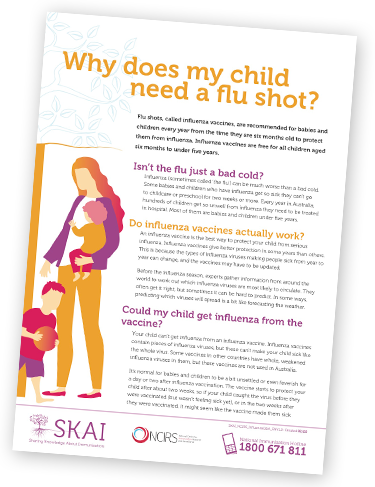Why does my child need a flu shot?
Key facts
-
Children and babies aged six months or older need to get an influenza vaccine every year.
-
Every year in Australia, hundreds of children get so unwell from influenza they need to be treated in hospital. Most of them are babies and children under five years.
-
An annual influenza vaccination is the best way to protect your child from serious influenza.
On this page
- Introduction
- Isn’t the flu just a bad cold?
- Do influenza vaccines actually work?
- Could my child get influenza from the vaccine?
- I’ve heard influenza vaccines can have serious side effects. Is this true?
- Does my child really need an influenza vaccine every year?
- How can we be sure influenza vaccines are safe?
- Further reading
